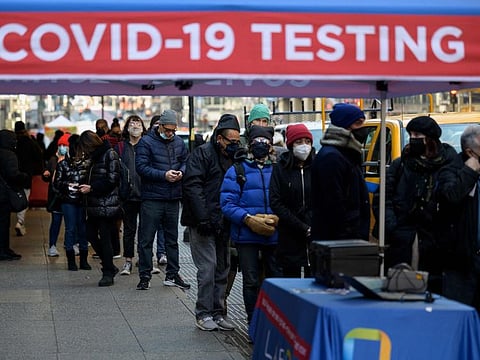COVID-19: Fauci warns against complacency as Omicron strains US hospitals
Rolling seven-day average number of new COVID-19 cases in US reaches 540,000

Cuyahoga falls, Ohio: Top US infectious disease expert Anthony Fauci warned on Wednesday against complacency about the Omicron variant of the coronavirus, saying the sheer number of cases could strain hospitals despite signs of lower severity.
The staggering pace of Omicron’s spread has snarled life across the country, upending the restart of school after the holiday break, halting air travel, shuttering entertainment venues and throwing a monkey wrench into back-to-office plans.
The rolling seven-day average number of new COVID-19 cases in the United States hit 540,000, a new high for an eighth consecutive day on Tuesday. Hospitalizations of COVID patients have risen 45% in the past seven days and stand at over 111,000, a figure not seen since January 2021.
“[Omicron] could still stress our hospital system because a certain proportion of a large volume of cases, no matter what, are going to be severe,” Fauci told reporters at a White House briefing.
In Ohio, the state with the second-highest per capita rate of COVID-19 hospitalisations in the country after Delaware, staff at a small community hospital said they are struggling to cope with the influx of patients.
Some patients have been in the 12-bed intensive care unit (ICU) at Western Reserve Hospital in Cuyahoga Falls for as many as six weeks, with most appearing to be suffering from the Delta variant, hospital staff said.
Patients as young as 30 are on ventilators, and three patients have died in a day on multiple occasions in the past couple of months, said Susan Straus, the hospital’s critical care director.
Doctor William Paster said roughly 80% of COVID patients at the hospital were unvaccinated and ward nurse Jodi Parsons said nearly all patients who required ICU care were unvaccinated.
Among the vaccinated, most survive the virus, even those with underlying health issues, Paster said.
“We’ve never seen numbers like were seeing now, and its totally overwhelming,” said Justine Neuwirth, a respiratory therapist at the hospital.
Other states also are feeling the strain of rising hospitalizations. Maryland is under a 30-day state of emergency as hospitalisations reached a new pandemic high on Tuesday.
Delaware, Illinois, Ohio, Vermont and Washington DC, have reported record numbers of hospitalised COVID patients in recent days.
So far, deaths nationally have held steady at about 1,300 on average each day, according to a Reuters count.
SCHOOL WOES
Omicron’s rapid spread has forced many companies and school officials to reconsider plans for returning to work and classes.
While most public school districts nationwide opted to reopen this week after the holidays, cities including Milwaukee, Atlanta and Detroit either implemented online instruction or delayed back-to-school due to staff shortages and Omicron concerns.
In Chicago, the nation’s third-largest school district, officials canceled classes on Wednesday amid a dispute with the teachers’ union.
The move came after the union voted late on Tuesday to return to remote learning and pushed for more rigorous safety protocols, including testing and mandatory vaccinations for students.
Chicago officials, including Mayor Lori Lightfoot, have been pressing to keep classrooms open, citing low hospitalisation rates among the city’s children and the adverse impact remote learning can have on minority and poor students in particular.
The Chicago Teachers Union has urged its members to stay out of the classroom and work remotely through January 18, or return sooner if the city reached minimum health-safety thresholds set last year as a condition for in-person learning.
Halle Quezada, a third-grade teacher in Chicago who has two children, ages 4 and 6, in the system, said she is frustrated the district has not taken more steps to address risks posed by the virus.
Her immunocompromised husband spent more than a week in the hospital last fall after contracting a breakthrough COVID-19 case, and she is desperate not to repeat the experience.
“Right now I dont trust the system to protect my children,” said Quezada, 34, who pulled her kids from school this week even as she went into her own classroom to teach.
Sign up for the Daily Briefing
Get the latest news and updates straight to your inbox



